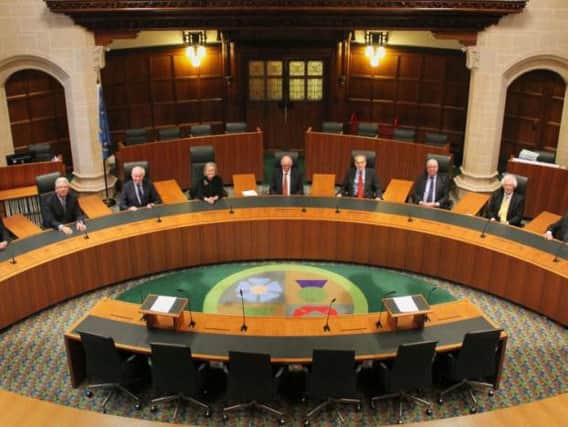The Supreme Court hearing on Brexit: What's it all about?


Why is the highest court in the land sitting in judgment on this issue?
The Supreme Court is being asked to overturn a High Court ruling that the Prime Minister must seek MPs’ approval to trigger the process of taking Britain out of the European Union.
Advertisement
Hide AdAdvertisement
Hide AdWhy did the High Court rule that there must be a debate in Parliament?
In a decision that infuriated Brexiteers, three senior judges said Theresa May lacked power to use the royal prerogative to trigger Article 50 of the Lisbon Treaty and start the two-year process of negotiating Brexit without the prior authority of Parliament.
Lord Thomas, the Lord Chief Justice, gave the ruling blocking the use of Article 50. Two other top judges - Master of the Rolls Sir Terence Etherton and Lord Justice Sales - agreed.
Even though it was emphasised to a packed court in London that they were deciding “a pure question of law” and not expressing any view about the merits of leaving the European Union, they faced fierce criticism from Leave campaigners and an accusation that they were “enemies of the people”.
How many Supreme Court judges will decide the issue?
Advertisement
Hide AdAdvertisement
Hide Ad11 Supreme Court justices - a record number to sit on an appeal - will have their say regarding one of the most important constitutional cases in generations. What happens if the Government’s appeal fails? If the appeal is unsuccessful, and any potential further appeal to the European Court of Justice in Luxembourg also fails, the Government’s plans for Brexit could be thrown into disarray. But Mrs May has made it clear she still intends to give an Article 50 notification by the end of next March to start the leave negotiations with 27 other EU countries.
Who’s the main man for the Government?
Brexit Secretary David Davis is leading the Government’s historic legal action. His team of lawyers, headed by Attorney General Jeremy Wright, will argue in the four-day Supreme Court hearing that the three High Court judges erred over Article 50 and its use was legally justified by the June 23 referendum vote in favour of quitting the EU.
The Scottish and Welsh governments and the Attorney General for Northern Ireland are all intervening in the case. Scotland’s Lord Advocate James Wolffe QC is to argue that it would be unlawful for the Article 50 process to start without a legislative consent motion (LCM) from Holyrood.
Who’s behind the court move to force the Government to allow MPs to debate the triggering of Brexit?
Advertisement
Hide AdAdvertisement
Hide AdThe High Court ruling was won by Gina Miller, 51, an investment fund manager and philanthropist who was selected to bring the lead case. She reported that her high-profile role had led to death threats and she had spent £60,000 on security, but she is returning to the battle represented once more by Lord Pannick QC.
Her case is being supported by “concerned citizens” drawn from all walks of life, including London hairdresser Deir Dos Santos, 37, who helped start the legal battle over Brexit but, say his lawyers, has been forced underground after receiving “vile” hate mail.
What’s the Government’s response?
The Attorney General said: “The country voted to leave the European Union in a referendum provided for by an Act of Parliament. “The Government is determined to respect the result of the referendum.
The Government’s case is that it does have legal power to trigger Article 50 on the timetable set out by the Prime Minister. We do not believe another Act of Parliament is necessary.”
What does the Opposition say?
Advertisement
Hide AdAdvertisement
Hide AdShadow attorney general Baroness Chakrabarti told BBC Radio 4’s Today programme: “As a matter of law, our overarching constitutional principle in this country - one indeed that many Brexiteers wanted to champion - is the principle of parliamentary sovereignty.
“The fact that the people have spoken via a referendum means that the people have spoken to Parliament.”
Lady Chakrabarti insisted that if Parliament was given a say, MPs and peers would not veto Brexit. She said: “We have been completely clear that we are democrats and respect the outcome of the referendum, even though many of us - myself included - campaigned in the opposite direction.
“So this will happen, pursuant to the will of the people. But there is not a simple question of ‘in and out of the European Union’, there are many questions that Parliament has to scrutinise about what happens next.”
Will we get a ruling this week?
Advertisement
Hide AdAdvertisement
Hide AdNo. Although the case is expected to be completed this week, it’s expected the court will not deliver its judgment until the New Year.
Can I watch the proceedings?
Yes. The Supreme Court is streaming the hearing live on its website. It’s expected that there will be high demand and the court says anyone unable to access its stream should be able to do so through the BBC, Sky and Channel 4 websites.